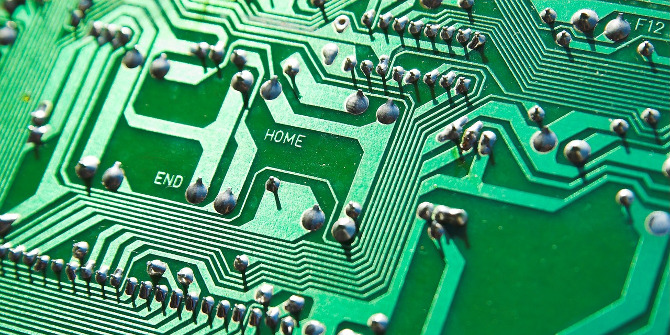What is Computer Science (CS) and who is it for?
To explain most simply, we must say that computer science is the study of information (data) and the method of using them (algorithms) to solve problems theoretically and practically.
Computer science does not mean the study of computers and does not always require the use of computers. It is possible to calculate data and algorithms using paper and pen, and this science is more dependent on mathematics than it is on computers, and that’s why some people prefer to use the word informatics instead of computer science.

What is a computer?
In general, a computer is a device that takes raw information from us and turns it into processed and understandable information for us. For example, when we are typing a text on the computer, the information is sent to the computer by the keyboard and the result is displayed to us through the monitor. Computers have high processing capabilities and can perform very high mathematical calculations in a few thousandths of a second.
What are the main components of a computer?
In simple language, computer consists of hardware and software.
Hardware:
Anything from the computer that can be touched is said to be touchable. For example, case, keyboard, mouse and monitor.
Software:
Anything that cannot be touched and is not physical is called a computer. For example, Windows or programs installed on it, such as Word software.
What are the 4 main skills that a computer specialist should have?
In order for us to become a computer expert, we need to acquire 4 main skills:
1- Installing and setting up a new computer system
That is, you must be able to prepare the hardware components that make up a computer and connect them to each other, then install Windows and related software on it, and then connect peripherals to it so that we can set up a complete computer system.
2- Updating or upgrading the previous system
Sometimes, after a few years, we face the problem of speed and slowness in the computer, and you must be able to update the software installed on the computer or the hardware used in the computer, or in other words, upgrade them.
3- Troubleshooting and solving hardware and software problems
While working with the computer, there may be problems that can be related to the hardware, or there may be a problem in the software and Windows. We should be able to find the source of this problem first and actually diagnose it and finally fix it.
4- Maintenance and support of computer systems
In order to increase the life of a computer, we must perform a series of operations related to its proper maintenance. This operation should be done continuously and with appropriate timings so that the computer system does not suffer from problems and irreparable consequences in the future. This item is of great importance for computers in companies and offices, and should be considered with less priority for home computers.
In the following, we will discuss each of these items in more detail and in detail.
First skill: installing and setting up a new computer system
The first skill that a computer expert needs to have is to be able to prepare, install and finally launch a complete system. For this, 5 steps must be done continuously to lead to the setup of a complete computer system
Computer science often overlaps with the other three fields, but despite the great connection between them, they should not be confused with each other:
• Computer engineering: It includes the study of data and algorithms in the field of hardware, and in it, they look for answers to questions such as how to establish communication between electronic components, how to design microprocessors and ways to improve the efficiency of chipsets.
• Software engineering: this branch can be considered applied computer science. Computer scientists seek to provide theories in computer science, but software engineers write applications that integrate these theories with algorithms.
• Information technology includes using software and hardware that has already been designed. IT professionals help maintain networks and provide solutions to networked applications and systems problems.
Despite the mentioned differences, most people use the word computer science to refer to all fields of programming, analysis and use of data and working with software and hardware, while computer science is the fields and disciplines. It includes a lot.
Computer science majors
If you intend to study computer science, you should know that the same lessons and courses are not taught in different universities. These universities do not even agree on the branches in computer science, let alone offer the same courses.
Below is a list of different computer science courses that are taught in different universities. As you can see, computer science includes many disciplines:
• Artificial intelligence: the development of machines with cognitive abilities such as thinking, speaking, reasoning and solving problems is placed in this field and combines subjects such as linguistics, psychology and neurology with computer science. Machine learning is also a subset of this branch that examines the ability of machines to learn, evolve and recognize patterns in data.
• Bioinformatics: the knowledge of using computer science to measure, analyze, model, and understand complexities in biology and includes large-scale data analysis, heavy computing, data simulation, molecular modeling, etc. is.
• Computational theory: knowledge is the study of algorithms and mathematical proofs. This branch is not only related to the creation of new algorithms and the improvement of existing algorithms but also to the improvement of methods and the proof of theories.
• Computer graphics: includes studying methods of using data and transforming them into forms that people can see and understand. This branch includes realistic images, dynamic images, 3D modeling, animation and visual images.
• Game development: production of computer, mobile and web-based games are included in this branch. Game engines vary in price and functionality and often contain unique algorithms and architectures optimized for real-time interaction.
• Networking: Knowledge is the study of distributed computer systems and how to improve computing between networks.
• Robotics: the knowledge of producing and developing algorithms used in robotic machines and includes improving the science of robot movement, interaction between humans and robots, environmental interactions, interactions between robots, virtual intermediaries, etc.
• Safety: development of algorithms, methods and software to protect computer systems against threats, malware and abuses are included in this branch. This branch includes network security and cloud computing, personal computer security, phone security, email security, antivirus software, and encryption and decryption.
To graduate in computer science from a college or university, you must have learned the following concepts:
• How to implement the tasks of computer systems at the hardware and software levels
• How to write code in different programming languages
• Nature and application of data structures and algorithms
• Computational concepts (for example, formal logic, graph theory, etc.)
• How to design a compiler, operating system and computer
Do you have the necessary characteristics to study computer science?
I would never ask people not to pursue a computer science degree just because they don’t have the necessary qualities. If you want to study in this field, then definitely do it. A lot of effort and perseverance in all work overcomes existing defects.
However, having some characteristics can make you enjoy studying in this field and have more chances of success. Getting a bachelor’s degree costs four years of your life, so to avoid wasting the best years of your life, have enough information about the field in which you are going to study. Suitable people to study in the field of computer science have the following characteristics:
• They are inquisitive and questioning by nature.
• They consider themselves forced to solve problems and puzzles.
• Their way of thinking is logical and step by step.
• They look at issues from unconventional angles.
• They seek to learn new things every day.
• Tolerate long periods of failure.
• They know how to search the web to find answers to their questions.
Problem-solving is a key skill in computer science, software engineering, and information technology. If you are not naturally curious and do not naturally like to solve different problems, you will not enjoy studying computer science much.

In addition, computer science is a field with constant changes and rapid growth, so if you are not interested in constantly learning new languages, library functions, programs, software, and code editors, you will quickly tire of studying in this field unless you Enough old content.
Studying computer science requires high creativity. In this field, unlike a writer, painter, or musician, you have to write code from scribblers, which requires thinking outside of normal frameworks and constant practice. Programming obstacles are one of the problems of programmers that you have to overcome many times by making appropriate decisions.
If you do not have any of the above characteristics, you may not be a good choice to study in this field, but if you feel that you have the mentioned characteristics, then we must congratulate you because you are entering a difficult but valuable field.
To be successful in this field, you should also know one more thing: at the beginning of entering this field, check and try as many different fields as you can. You may even be surprised by your talent in a particular field. But once you find the right field, focus on it and try to become an expert in it. It may be interesting to jump from one branch to another as a hobby, but such people rarely achieve high expertise in a job
